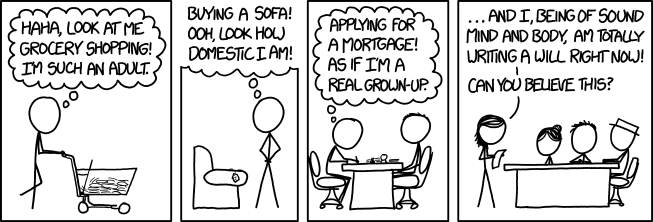How I'm Preparing For Sickness, Old Age, And Death

After years of procrastination, my partner Jennifer and I filled out our advance directives, healthcare proxies, and wills.
Advance Directive and Healthcare Proxy
In my "advance directive", also known as a "living will", I left instructions for how I should be treated if I'm incapacitated.
When I searched for a template, the first I found was Five Wishes. It's well-known, but I resented the $5 fee to download it, and the sample directives included:
- the obvious: "I wish for my bed linens to be kept clean,"
- the absurd: "I wish to be massaged with warm oils as often as I can be,"
- and the unenforcible: "After my death, I wish for my family and friends to remember me as I was before I became ill."
In contrast, The National Hospice and Palliative Care Organization has a no-nonsense form:
The form determines who will make decisions for me when I cannot, and states my advance instructions. I designated Jennifer and my mother, and instructed them:
I want life-sustaining treatment withheld if I'm terminally ill, or at least 80 years old, or if there's a less than 50% chance that I will recover reasonable physical ability. Additionally, withhold life-sustaining treatment if there is more than a 25% chance that I will live with irreversible dementia or other mental impairment of any sort.
The form need not be notarized in New York, so Jennifer and I just signed ours with a friend as witness, put them in our files, and mailed copies to our families.

Do Not Resuscitate
The Advance Directive form's instructions warn me,
Be aware that your New York document will not be effective in the event of a medical emergency. Ambulance and hospital emergency department personnel are required to provide cardiopulmonary resuscitation (CPR) unless they are given a separate directive that states otherwise.
That's what a "do not resuscitate" or "DNR" order is for, and it's separate from the advance directive. I didn't sign one: I'm young enough that if ER doctors think they can revive me, they should give it a shot. (Although it usually doesn't work.)

Will
Our final step was writing our wills. We procrastinated this step longer than the others—maybe it was the hassle of finding a notary public, or it represented a degree of adulthood greater than the previous steps, or maybe we were just busy and life got in the way of preparing for death.
This month, Jennifer and I used Willing.com to generate a Last Will and Testament for each of us. The site’s free Basic plan was sufficient for both of us. For the moment, I’m leaving everything to Jennifer, or if she’s dead, to my Zen temple the Village Zendo. Ideally, my executor would be someone likely to outlive me, but I couldn’t think of anyone younger whom I trust, so I designated Jennifer or my mother as executors. I’ll update it later. We took our wills to my company’s office to sign: one of my colleagues is a notary, and there are plenty of people around to be witnesses.
Willing.com lets me write a letter to my executor with instructions about my funeral:
I want to donate my body to science and organ and tissue donation. I’d like any unused bits of me cremated. I would like a simple memorial service at the Village Zendo.
My executor’s job will be easier if they can decrypt all my passwords when I’m dead. I use 1Password, and their family plan might have the feature I need. I’ll save that chore for a rainy day.

Talking About Death
Neither of us is very afraid of death. In fact, due to our blunt personalities and years of Zen practice, we enjoy thinking and talking about death. So when I heard that Green-Wood Cemetery hosts a Death Café once a month, I signed us up for the very next one.
The event was a gathering of about 20 people in Green-Wood’s posh chapel, led by a funeral director named Amy Cunningham. She split us into small groups, and we spent an hour sharing stories about death. My group sat by a Chinese-style fountain, water trickling over rocks and moss. A man in my group talked about his wife’s death a few months before, from a painful illness that made her cough 24 hours a day. A woman described her work talking with dying people in hospice care, and another woman tried to explain why her nephew’s suicide, by throwing himself in front of a train, was so peculiarly hard to accept. I told the story of my father-in-law Ron Armstrong’s life and recent death, and I talked about my grandfather Milton Rubin’s funeral fifteen years ago, how perplexed I’d been by his sudden absence. I had put my hand on his coffin and tried to believe he was inside it, and later, once he was cremated, I tasted his ashes and tried to believe they had been his body.
Now that I’ve completed my advance directive, healthcare proxy, and will, and written down how I wish my body to be disposed, I have a sense of satisfaction that even beats taking out the compost. Doing it with my partner helped me get the job done, and it inspired us to have frank conversations. I might die at 85, or crossing the street tonight—at least my affairs are in order.
Images:
